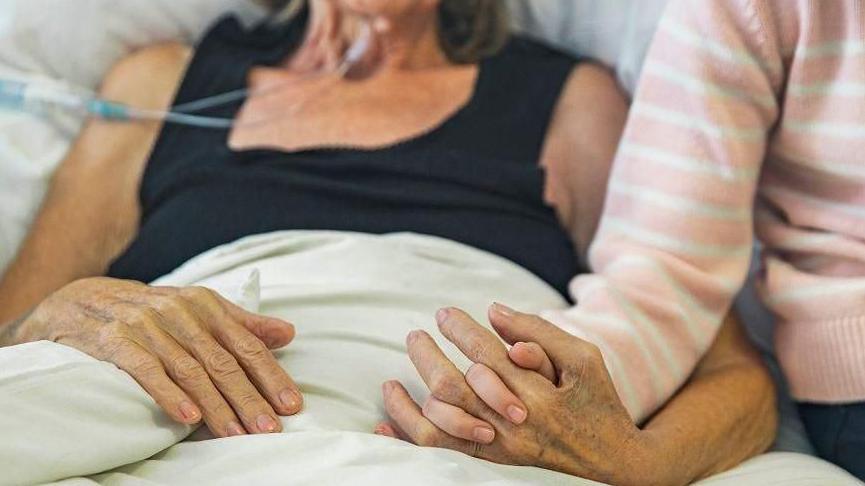Assisted deaths could be more than 4,000 in 10th year after law change

- Published
The number of assisted deaths could be more than 4,000 in the 10th year after the law comes into force in England and Wales if MPs vote for it, a review of the policy says.
The estimate forms part of the official impact assessment, external, carried out by civil servants to inform MPs as they debate whether to allow assisted dying.
It said initially the numbers coming forward would be low, but are expected to grow over time.
The impact assessment says that the total number of assisted deaths is estimated to range from between 164 and 787 in the first (half) year of the service to between 1,042 and 4,559 in year 10, and assuming a start date to the policy of October 2029.
The upper estimate of just over 4,500 assisted deaths would still only represent less than 1% of all deaths, the document said.
The impact assessment also provides a financial analysis of the costs and savings involved – it is not a document that gets into the ethical or philosophical arguments for and against the policy.
It comes as the bill returns to the House of Commons later this month, with a crucial vote that will determine whether the bill becomes law expected to happen in mid June.
Costs and savings
In the first six months, savings for the NHS could range from around £919,000 to £10.3m.
This figure includes hospital care, primary and community care, hospice, medicines and other care costs that someone choosing an assisted death would not need.
By the time the system has been running for ten years, savings could range from £5.84m to £59.6m.
But there will be costs too. Staffing an assisted dying service could cost in excess of £10m a year within a decade. And training costs in the first six months alone could be over £11m.
One assisted death would likely involve six health and care professionals working 32 hours.
It said this could take staff away from existing services, but the overall impact of this was uncertain.
And each panel that would review cases, comprising of a lawyer, psychiatrist and social worker, could cost £2,000 a day.
Overall, it said it was not possible to calculate whether the costs outweighed the savings or vice versa as there were too many uncertainties.
The Department of Health and Social Care said the government was neutral on the issue. It said the document had been produce to help ensure any legislation that passes through parliament is "workable, effective and enforceable".
Kim Leadbeater, the Labour MP behind the bill, said she was grateful for the work that had been done on the impact assessment.
She said she was still "firmly of the view that the overall impact of this long overdue reform will be to make end of life care in England and Wales more compassionate and significantly safer".
Speaking to BBC Radio 4's Today programme, she said: "For me, assisted dying and giving people a choice at the end of their life when they are facing a terminal illness is about the human cost, it's not about pounds and pence."
But Baroness Tanni Grey-Thompson, a former Paralympian and member of the House of Lords, who opposes assisted dying, said: "This assessment highlights how assisted dying would put disabled and other vulnerable people at grave risk by providing financial incentives to an already overburdened and under-resourced NHS to offer assisted dying as a 'treatment option'."
Leadbeater told Today the eligibility criteria under the bill was "extremely strict".
She said: "You have to be terminally ill. There are multiple layers of safeguarding built into the bill, including a multi-disciplinary panel of experts.
"So we are assessing mental capacity, we are checking for coercion at every level of this process to make sure that this is the clear and settled informed wish of the person who is terminally ill."
She said that the bill was "only about terminally ill adults who have less than six months to live". "The bill does not cover people with disabilities," she added.
Prof Katherine Sleeman, professor of palliative care at King's College London, said the cost of end of life care was "very, very high", adding "obviously if someone is not living those last months of life then it's lower".
However, she cautioned that the figures in the assessment were estimates.